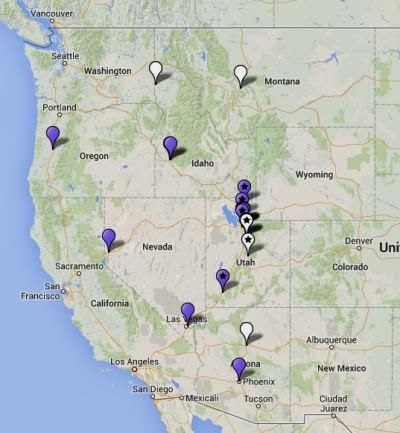More hosting hubs, more partners, larger service area
Who exactly is the Mountain West Digital Library? Well, as we grow, it keeps changing! And, as we grow, our notions of participation, governance, and funding are evolving too. Now that we are sharing 560 collections from 130 partners, hosted on 17 repositories located in 6 western states, we are entering another stage of improving how we work together to provide services to memory institutions in the region.
 |
| MWDL Hosting Hubs in 2008 |
As many of you know, MWDL had its start in 2001 as a program of the Utah Academic Library Consortium, started by Kenning Arlitsch at the J. Willard Marriott Library at the University of Utah. The first hosting hubs whose digital collections metadata were harvested into the MWDL portal were from Utah: Marriott Library, Harold B. Lee Library at Brigham Young University, Merrill-Cazier Library at Utah State University, and Sherratt Library at Southern Utah University. The central search portal launched in 2002, and the UALC Digitization Committee has overseen the effort from the start, with governance and funding from the UALC Council of Directors and in-kind support from the Marriott Library.
By 2008, we had nine hosting hubs, including other hubs in Utah and two in Nevada, and a full-time director (lucky me!) was hired for the program. We coordinated our efforts through an MWDL Partnership Agreement and an MWDL Digitization Price List, and various task forces updated policies and standards for the network over the next few years. The map to the right shows the hosting hubs in 2008, all of whom participated in setting up those agreements and that structure (click to see larger map).
 |
| MWDL Hosting Hubs in Feb. 2014 |
Since 2008, and accelerating after we announced our affiliation with the Digital Public Library of America in late 2012, we have expanded our collaborative to include new repositories and new collections partners from a broader geography of the Mountain West. See the map to the left for all the hosting hubs we are working with (click the map to see more detail). Some hosting centers have more than one repository — for example, many academic libraries maintain separate servers for cultural heritage materials and scholarly publications.
We are pleased to welcome our newest colleagues and look forward to the changes ahead, as we explore new modes of collaboration and greater levels of service to memory institutions around the region. Thanks to all of our hosting hubs for the services you provide!


No Comments